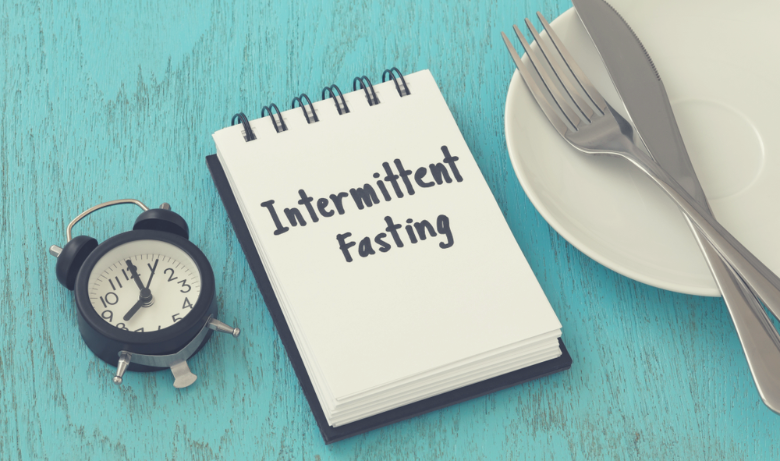I was skinny as a child, so in my teenage years I lifted weights and got involved in sports. I noticed the results, and this fueled my love for exercise and weight lifting through my 30s.
When I hit mid-30s, a car accident made it impossible for me to exercise.
Following my recovery, I lost my motivation, put on weight, and battled depression. With my 40th birthday on the horizon, I realized that I needed to do something.
That’s when a friend of mine introduced me to intermittent fasting.
What Is Intermittent Fasting?
I did not understand what fasting intermittently was. However, I saw the results it had for my friend, so I learned more.
The first thing I realized is that intermittent fasting is not a diet. Instead, it is a pattern of eating. The cycle includes periods of time when you eat and other times when you do not.
Diets focus on what you eat, whereas fasting intermittently focuses on when you eat.
Depending on a person’s preference, they could fast for as little as 16 hours or as much as 24 hours. They could fast every day of the week, or they could fast just a few times a week.
I had doubts about whether this was healthy. A little research showed that humans have been fasting for millenniums. Some, including Christians, Muslims, and Buddhists, do it for religious reasons.
At other times, humans have fasted out of necessity. Before supermarkets and structured agriculture, people would have to go long periods of time between meals.
Even in the animal kingdom, fasting is part of existence. Animals hunt, they eat, and they may go days without eating again until the next successful hunt.
Meditating on these basic concepts left me more open to fasting.
What Are the Different Styles of Intermittent Fasting?
Method 1: 5:2 Twice a Week
With this method, you focus on eating 500 calories or less two days out of the week. For the other days, you eat a normal healthy diet.
On the days you fast, you can have a 200 calorie meal followed by a 300 calorie meal. It’s important that your meals are high-protein and high-fiber.
These things will keep you full, they will give you the most energy, and they will keep your calories as low as possible while you are fasting.
Your fasting days should be nonconsecutive. For example, you can fast on Monday, eat normally on Tuesday, and fast again on Wednesday.
On non-fasting days, avoid the tendency to binge. Your diet should consist primarily of healthy and nutritious food.
Method 2: Alternate Day Fasting
This method has you fasting every other day. Some people limit their calories to 500 when they are fasting, while others consume zero calories.
On your non-fasting days, you should resume a regular healthy diet.
Method 3: Time Restricted Eating
With this option, there are eating and fasting windows. One of the more popular options is the 16/8 method. You fast for 16 hours of the day and only eat during eight hours of the day.
This method is popular because most people are fasting while they are asleep. If you eat at 11 AM and stop eating by 7 PM, you spend most of your fasting time asleep.
You can repeat this method every day of the week or do it a couple of days out of the week based on your preference.
The trick with this fasting method is finding the right fasting window for your schedule.
Because of its flexibility and relative ease, the 16/8 method is a good bet for people who are looking to try fasting intermittently for the first time.
Method 4: 24 Hour Fast
This is a more extreme form of fasting. Most people can only do it a few days out of the week. The side effects include hunger pains, low energy, fatigue, and headaches, so it can be challenging for some people to endure.
It’s recommended that you go back to a healthy diet when you are on non-fasting days.
Intermittent Fasting is not a magic pill. Weight loss, success, and health benefits come down to the number of calories you consume and the quality of those calories.
You can’t expect to eat junk food on your non-fasting days and expect to lose weight.

What Are the Benefits of Intermittent Fasting?
There are many studies and anecdotal evidence showing the powerful benefits fasting can have on your body and your brain.
Changes the Function of Cells, Hormones, and Genes
If you go hours without eating, several changes happen to your body. Your body activates key cellular repair operations.
Hormone levels change, and these make the fat stored in your body more accessible. Other changes include a noticeable drop in insulin levels, which facilitates fat burning, and an increase in human growth hormone production, which can increase fat burning and muscle gain.
There are other health benefits to increased human growth hormone levels.
Fasting intermittently encourages the body’s cellular repair process as it helps remove waste products from the cells.
There also seems to be positive changes in genes and molecules related to longevity and protection against certain diseases.
Fasting Intermittently Can Help You Lose Belly Fat
Most people turn to intermittent fasting because they want to lose weight. When a person fasts intermittently, they eat fewer meals.
As long as they do not compensate by overeating during their meals, they take in fewer calories.
At the same time, fasting intermittently encourages the body to produce hormones that make weight loss easier.
As the body produces less insulin and more norepinephrine, it can break down fat and use that fat for energy.
Some research shows that fasting intermittently can up your metabolic rate, so you burn more calories in a shorter period of time.
This means that short-term fasting attacks both sides of the calorie to body weight equation. On the one hand, your metabolic rate goes up, so you are burning more calories.
On the other hand, you are eating less food, so you are introducing fewer calories.
When done properly, it is possible for a person to lose up to eight percent of their weight in as little as 24 weeks.
People who stick to IF lose between four and seven percent, which is a lot of belly fat. The nice thing is that IF causes less muscle loss than just being on a calorie-restricted diet.
Fasting Intermittently May Reduce Insulin Resistance, Making a Person Less Susceptible to Type II Diabetes
One major concern I had as I put on weight was developing type II diabetes. Type II diabetes has become more common in our society.
When a person can reduce their insulin resistance, theoretically, their blood sugar levels should lower. This serves as a protection against type II diabetes.
What’s neat about fasting intermittently is that research shows it positively affects insulin resistance, making it a powerful tool in reducing blood sugar levels.
Studies have shown that IF can reduce blood sugar levels by up to six percent. While a person is fasting, insulin production can be reduced by up to 31 percent.
One of the biggest challenges a person with diabetes faces is kidney damage. Studies done on rats have shown that fasting intermittently can protect against this infirmity.
There seems to be some discrepancy between how fasting affects the blood levels of men as opposed to those of women.
How Fasting Intermittently Can Lower Inflammation
Acute inflammation is a normal part of the body’s infection fighting process. Chronic inflammation can affect your heart and has been connected to cancer, multiple sclerosis, and inflammatory bowel disease.
Caloric restriction has been shown to improve inflammatory diseases. Researchers have been able to show that fasting minimizes the release of pro-inflammatory cells.
Over long periods of fasting, the research has shown that these cells fall into a standby or sleep mode. They are less inflammatory than they are in someone who is eating constantly.
When a person looks at the number of diseases linked to chronic inflammation and the large number of people affected by diseases, it is clear to see the potential that IF can have.
The Beneficial Effects of Fasting Intermittently on Your Heart
Research points to fasting as a way of lowering blood pressure, reducing cholesterol, and reducing weight. These things are better for your heart.
Many of the studies that have been done on the effect fasting has on the heart were performed on animals.
More studies needs to be done on the effects that fasting intermittently can have on the heart health of humans.
The Positive Way Fasting Intermittently Affects Your Brain
Understandably, if fasting is good for your body, it will have a positive effect on your brain. IF has a positive effect on multiple metabolic features that have been linked to brain health.
Included in this is a reduction in oxidative stress, blood sugar levels, inflammation, and insulin resistance.
Animal studies have shown that fasting could increase the growth of nerve cells that are directly linked to brain function.
There are some studies that show a link between IF and protecting the brain from the damage caused by a stroke.
Alzheimer’s seems to be impacted by fasting intermittently. As you know, there is no cure for Alzheimer’s.
The best thing a person can do is to try to prevent it from developing. Studies in animals show that fasting may prevent the onset of Alzheimer’s or reduce its severity.
Intermittent Fasting May Help You Live Longer
Animal studies show that fasting may have the same effect on a person’s longevity that continuous calorie restriction does.
Some rats that fasted every other day had an 83 percent longer lifespan than rats that did not go through the fast.
Just because something works on rats doesn’t mean it will work on humans. Still, people who are concerned about aging are attracted to fasting intermittently.

Safety Concerns and Side Effects of Intermittent Fasting
As we have seen, there are several benefits to fasting. However, IF is not for everyone. There are few signs that may show that IF is an unhealthy or unsafe routine for you.
Constant Preoccupation about What to Eat Next Could Indicate Orthorexia
Orthorexia is a disease where a person is obsessed with healthy eating. Signs of this disease may include a desire to talk about your diet all the time and constantly being worried about your next meal.
Symptoms may include avoiding or canceling social meetings because they are not in harmony with your eating habits.
Not Being Able to Sleep
There is some evidence that shows fasting intermittently can improve your sleep. Since you will fast in the hours before you go to sleep, this helps you to avoid nighttime snacking and can improve the quality of your sleep.
However, IF may disrupt your sleep cycle, decreasing your REM sleep, which is connected to mood, memory, and learning capacity.
Lethargy or Loss of Awareness
In the short term, fasting intermittently can create a sense of hyper-focus or hyper awareness.
This is because your body is not getting the same levels of food it is accustomed to, so it interprets this as starvation. As a result, the brain becomes focused on the goal of helping you find food.
However, over the long term, if a person does not eat enough during their fasting window, their body may not have sufficient energy. This leads to loss of concentration, fatigue, and dizziness.
Increased Irritability
The biochemistry that regulates the way you feel is also what regulates your appetite. Nutrition consumption impacts dopamine and serotonin levels.
These play a role in depression and anxiety. If you do you regulate your appetite by fasting, you may also deregulate your mood.
This could lead to you feeling irritable while you are fasting.
Binge Eating
The way you break your fast is just as important as doing the fast itself. Some people break their fast by going on a binge of unhealthy food.
If you do that, you are negating all the benefits of the fast.
How Should I Get Started with Intermittent Fasting?
IF can seem intimidating. There are some things you can do to make the task less daunting.
Identify the Reason for the Fast
Why do you want to fast? Are you looking to lose weight or maintain your weight? Some people turn to fasting as a way of relieving symptoms caused by diabetes, heart disease, or inflammation.
Others see it as a way of avoiding unwanted medication. You may see fasting as a preventative method for helping avoid serious diseases.
Whatever your reason for fasting, it is good to have the following things clearly in mind.
Six Simple Steps to Get Started
- Talk to your medical professional before you start. This is especially important if you have medical conditions that could be impacted by fasting intermittently.
- Keep things simple. During your fasting time, drink water, black coffee, or unsweetened tea.
- Keep things easy. Eat the same nutritious foods you ate before beginning IF. Once you feel comfortable fasting, then you may want to start tweaking your diet to have lower carbs or avoid carbs altogether. But that’s for the future. Right now, your goal is to start and finish the fast.
- Set a reasonable time to start. After looking at your circumstances, find the fasting window that works best for you. For some people, it works best to fast while they sleep and then continue on until lunchtime. For others, it works best to eat breakfast and then finish their feeding window six to eight hours later.
- Choose the days you will fast. It may work best for you to fast over the weekend. Or fasting may work better for you during the week. What you want to find are days when you will be so preoccupied with other things that you won’t even notice the time passing.
- Slip-ups happen. For all of our determination and all of our willpower, we are going to have some slip-ups. Don’t beat yourself up. Forgive yourself and keep moving forward.
Concluding Thoughts
After reading all this information, what do you think? Is intermittent fasting the right option for you?
Fasting, like a low-carb diet or a calorie restricted diet, is just a tool that you can use to improve your health and lose weight.
However, fasting will only be effective if you can stick to it consistently for a longer time.
Fasting is a lifestyle strategy that can improve your health. If you don’t like the idea of fasting, then keep searching for something that will work for you.
There is no such thing as a one-size-fits-all solution. The best solution is the one that you can stick to for the long haul.
However, if you are like me, you will find that you feel good when fasting. You will see that it is a sustainable way to eat less food.
And you will find that it is a powerful tool that will help you improve your health and lose weight.



